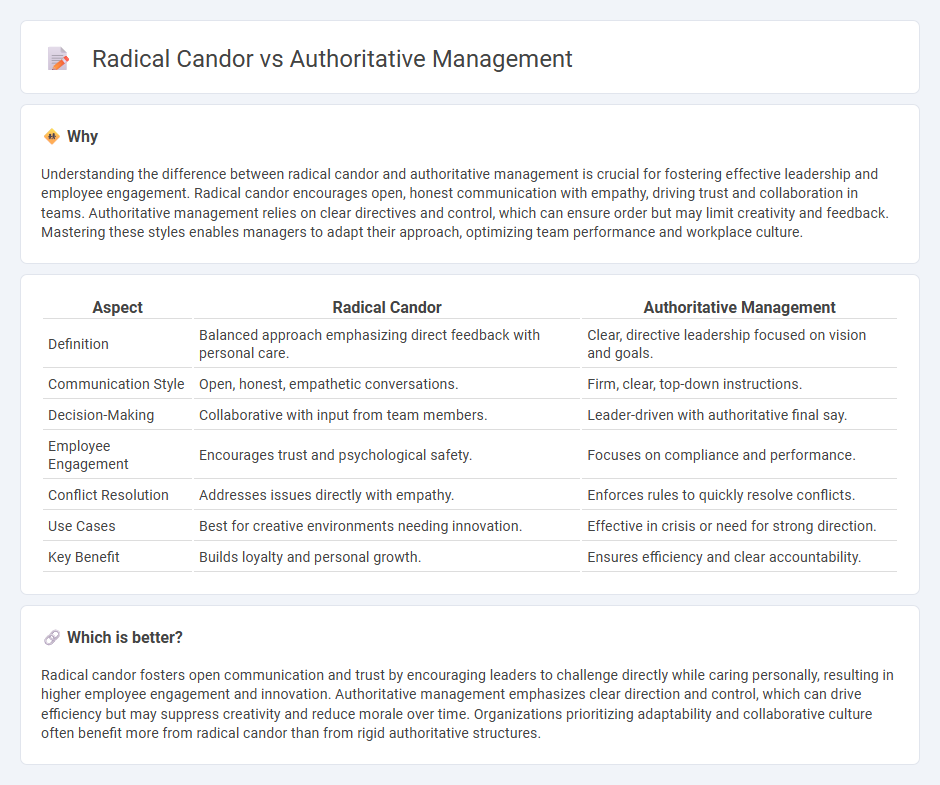
Radical candor emphasizes open, honest communication combined with genuine care for employees, fostering a collaborative and transparent workplace culture. Authoritative management, in contrast, relies on clear directives and firm leadership to drive performance and maintain order. Explore how these distinct management styles impact team dynamics and organizational success.
Why it is important
Understanding the difference between radical candor and authoritative management is crucial for fostering effective leadership and employee engagement. Radical candor encourages open, honest communication with empathy, driving trust and collaboration in teams. Authoritative management relies on clear directives and control, which can ensure order but may limit creativity and feedback. Mastering these styles enables managers to adapt their approach, optimizing team performance and workplace culture.
Comparison Table
| Aspect | Radical Candor | Authoritative Management |
|---|---|---|
| Definition | Balanced approach emphasizing direct feedback with personal care. | Clear, directive leadership focused on vision and goals. |
| Communication Style | Open, honest, empathetic conversations. | Firm, clear, top-down instructions. |
| Decision-Making | Collaborative with input from team members. | Leader-driven with authoritative final say. |
| Employee Engagement | Encourages trust and psychological safety. | Focuses on compliance and performance. |
| Conflict Resolution | Addresses issues directly with empathy. | Enforces rules to quickly resolve conflicts. |
| Use Cases | Best for creative environments needing innovation. | Effective in crisis or need for strong direction. |
| Key Benefit | Builds loyalty and personal growth. | Ensures efficiency and clear accountability. |
Which is better?
Radical candor fosters open communication and trust by encouraging leaders to challenge directly while caring personally, resulting in higher employee engagement and innovation. Authoritative management emphasizes clear direction and control, which can drive efficiency but may suppress creativity and reduce morale over time. Organizations prioritizing adaptability and collaborative culture often benefit more from radical candor than from rigid authoritative structures.
Connection
Radical candor enhances authoritative management by fostering clear, honest communication while maintaining strong leadership authority. This approach encourages managers to provide direct feedback with empathy, driving accountability and trust within teams. Combining radical candor with authoritative management promotes a culture of transparent decision-making and effective performance.
Key Terms
Decision-making power
Authoritative management centralizes decision-making power, with leaders setting clear expectations and directing team actions to ensure alignment and efficiency. In contrast, radical candor empowers employees by encouraging open, honest communication and collaborative decisions, fostering trust and innovation. Explore further to understand how decision-making approaches impact organizational culture and performance.
Feedback style
Authoritative management leverages a feedback style centered on clear, directive communication combined with motivational support to guide performance and align team objectives. Radical candor emphasizes honest, direct feedback balanced with genuine care for individuals, fostering an environment of trust and continuous improvement. Explore deeper distinctions and applications of feedback styles to enhance your leadership effectiveness.
Employee autonomy
Authoritative management provides clear direction and structured guidance, often limiting employee autonomy to ensure alignment with organizational goals. Radical candor encourages open communication and empowers employees by fostering trust and honest feedback, promoting greater independence in decision-making. Explore how these leadership styles impact employee autonomy and team dynamics in detail.
Source and External Links
Mastering Authoritative Leadership: Key Strategies for Effective Teams - This article discusses authoritative leadership as a style where leaders set a compelling vision, provide direction, and inspire team alignment with strategic goals.
What Is Authoritative Leadership? Definition & Examples - This page defines authoritative leadership as a style characterized by clear direction, vision, and inspiring team members to achieve shared goals.
5 Pros & Cons of Authoritative Leadership - This article discusses the pros and cons of authoritative leadership, highlighting its clarity, direction, and motivational impact on teams.
 dowidth.com
dowidth.com